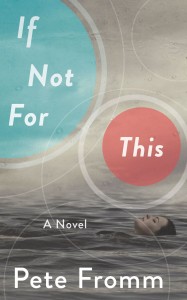240 pages, $15.95
Review by Heidi Willis
If you go by the photos of his cowboy-handlebar-mustache and his memoir revelations of fighting mountain lions, the four-time Pacific Northwest Bookseller Award winner Pete Fromm is nothing like the narrators of his novels. He is not a fifteen-year old boy desperately trying to live up to the dreams of his manic sister (How All This Started), and he is decidedly not a coming-of-age girl wrestling with sex and an absent father (As Cool As I Am). Yet by the first page in, you’d forget he is neither of those.
Fromm’s newest novel, If Not for This, takes on an even greater hurdle–writing from the point of view of a woman dying of multiple sclerosis. It is a bold tactic that, under a lesser writer, might tend towards melodrama or cliché. Fromm, however, creates a narrator that crackles with sarcasm, wit, and an authenticity that makes the risk pay off.
At its most basic form, If Not for This is a love story that chronicles the relationship of Maddy and Dalton from the day they meet to the inevitable end. But to say this is a love story sounds schmaltzy in a way Maddy would hate. She is anything but sappy, her fierce independence serving her well as a river guide in Wyoming, where she meets Dalt. Their lives mirror the boats they guide, wild and unmoored, both Mad and Dalt giddy by “that light [that] tumbles inside when you realize you’re rootless, that your next step could be in any direction whatsoever.”
The wideness of their lives, however, quickly shrinks as life closes in on them, finances, children, the need for stability all drawing them further from their dream of living off the river, but it’s the diagnosis of MS that seals Mad’s fate and sets the course of the rest of the book. Despite the fact that MS is as present as a character itself, the story is not about the disease; it is about the insidious effects it has on their relationship.
Although the intensity of love between Maddy and Dalt is palpable, it’s the love that also causes the rifts between them. While Maddy wants to ignore and deny the deteriorating effects of the MS – the vertigo, the fatigue, the increased difficulty walking, talking, and eating – Dalton’s mission is to adapt life around them to accommodate her, and she doesn’t hesitate to say how much this pisses her off. When he builds a handrail for the inescapable day she will need it, even though their second child has just been born, she snaps at him, “That’s right, there’s got to be a dark cloud somewhere around this silver lining. We just have to look hard enough.”
Page by page, MS threatens to cost Maddy nearly everything she has – her dream job, her friends, her independence, even the unshakability of her family, but she clings to the fairy tale she’s found with Dalt. Never sweet, never perennially sunny, she still calls herself and Dalt the Luckies. “I get swept over with regret that they, neither of [the kids], will ever know anything so great. Because really, me and Dalt? There’s no way anything this huge could ever happen again, not in this universe. We’ve used it up. All the luck. Which, well, sucks for them.”
Fromm’s writing is, as always, pared down to the essential. Every word is chosen for its power, the dialogue punched, the narrative poetic but never flowery. It is this way of holding back that keeps this story from going melodramatic. This, and the voice of Maddy, who will become more real to you in a single chapter than the neighbor next door.
Someone once told me that the job of a writer is to show what it means to be human. Pete Fromm does this better than almost any writer I’ve read. The joys, the frustrations, the intensity of love between Dalton and Maddy that is both freeing and confining will remind you how fragile life is – something Mad knows from the beginning: “I reel back to the anchor point: the morning after our first night ever. And the air I breathe gets all rarified even now, remembering how stunned I was, how hardly daring to believe. I can’t quite swear I believe it yet, believe we’ll last through even this.” And though you know she can’t, you’ll find yourself holding your breath, hoping she will.
***
Heidi Willis is a writer, editor, and photographer. Her work has appeared in The Potomac Review and Campus Life, and her debut novel, Some Kind of Normal, was published by NorLights Press in 2009.
![[PANK]](https://pankmagazine.com/wp-content/themes/pank/assets/images/pank-logo-large.png)

